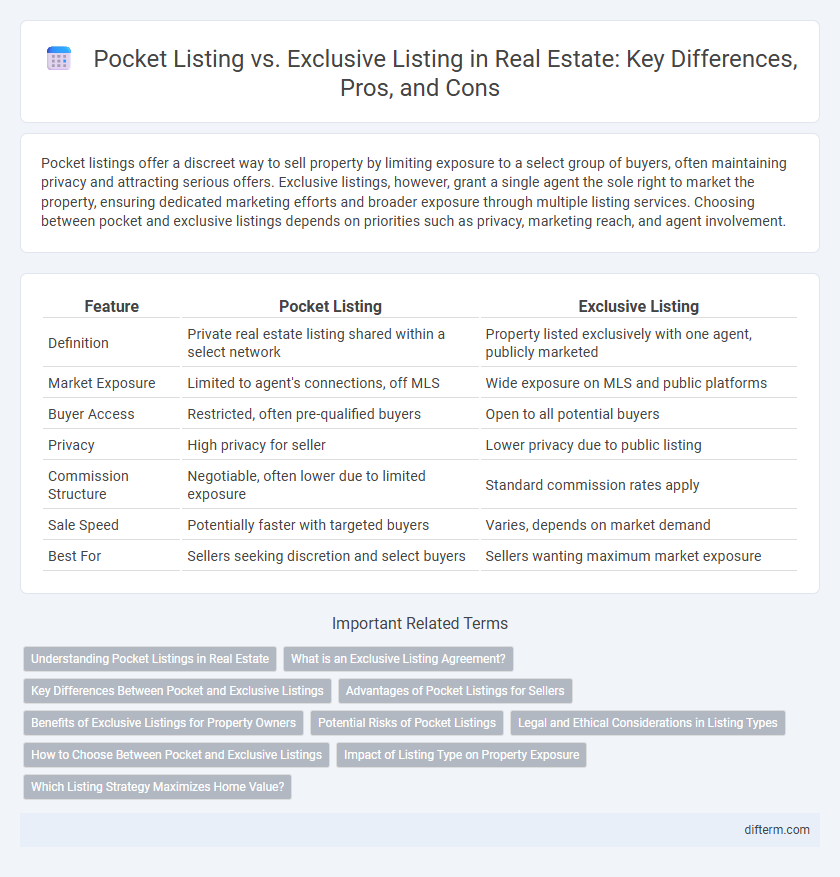Pocket listings offer a discreet way to sell property by limiting exposure to a select group of buyers, often maintaining privacy and attracting serious offers. Exclusive listings, however, grant a single agent the sole right to market the property, ensuring dedicated marketing efforts and broader exposure through multiple listing services. Choosing between pocket and exclusive listings depends on priorities such as privacy, marketing reach, and agent involvement.
Table of Comparison
| Feature | Pocket Listing | Exclusive Listing |
|---|---|---|
| Definition | Private real estate listing shared within a select network | Property listed exclusively with one agent, publicly marketed |
| Market Exposure | Limited to agent's connections, off MLS | Wide exposure on MLS and public platforms |
| Buyer Access | Restricted, often pre-qualified buyers | Open to all potential buyers |
| Privacy | High privacy for seller | Lower privacy due to public listing |
| Commission Structure | Negotiable, often lower due to limited exposure | Standard commission rates apply |
| Sale Speed | Potentially faster with targeted buyers | Varies, depends on market demand |
| Best For | Sellers seeking discretion and select buyers | Sellers wanting maximum market exposure |
Understanding Pocket Listings in Real Estate
Pocket listings in real estate refer to properties marketed privately without public exposure on the Multiple Listing Service (MLS), targeting a select group of buyers through the agent's network. This approach can create exclusivity and potentially yield higher offers due to limited competition, but it may reduce market visibility and affect pricing transparency. Understanding pocket listings is essential for sellers aiming to balance privacy with market reach and for buyers seeking access to unique, off-market opportunities.
What is an Exclusive Listing Agreement?
An Exclusive Listing Agreement grants a single real estate agent or broker the sole right to sell a property within a specified period, ensuring dedicated marketing efforts and higher commission control. This contract legally binds the property owner to work exclusively with the agent, preventing other brokers from listing the property independently. Exclusive listings often result in broader exposure and professional negotiation, increasing the likelihood of achieving optimal sale terms.
Key Differences Between Pocket and Exclusive Listings
Pocket listings remain off the public MLS, offering privacy and limited exposure to select buyers, while exclusive listings are publicly marketed through MLS with broader visibility. Pocket listings often expedite sales by leveraging agents' personal networks, contrasting with exclusive listings that attract a larger pool of potential buyers and competitive offers. Pricing strategies in pocket listings tend to be more flexible due to restricted market exposure, whereas exclusive listings usually undergo market-driven appraisal reflecting full transparency.
Advantages of Pocket Listings for Sellers
Pocket listings offer sellers increased privacy by limiting exposure to a select group of qualified buyers, reducing the risk of unwanted showings and maintaining confidentiality. These listings often create a sense of exclusivity, potentially driving higher offers from motivated buyers eager to access off-market properties. Sellers also benefit from faster transactions and lower marketing costs by bypassing traditional multiple listing services (MLS).
Benefits of Exclusive Listings for Property Owners
Exclusive listings provide property owners with heightened market exposure through targeted marketing strategies and access to a wider network of qualified buyers, enhancing the likelihood of a faster sale. These listings ensure dedicated agent commitment, offering personalized support and negotiation expertise to maximize the property's value. Property owners benefit from increased confidentiality and control over showings, minimizing disruptions while maintaining premium positioning in the competitive real estate market.
Potential Risks of Pocket Listings
Pocket listings pose potential risks such as limited market exposure, which can reduce competition and lead to lower sale prices. They may also create ethical concerns due to a lack of transparency and potential conflicts of interest between agents and sellers. Furthermore, pocket listings restrict buyer access, limiting the pool of qualified purchasers and prolonging the time on market.
Legal and Ethical Considerations in Listing Types
Pocket listings limit property exposure to a select group of agents, raising legal concerns about fair housing laws and potential discrimination risks. Exclusive listings grant a single agent the right to market a property, requiring strict adherence to fiduciary duties and clear contractual terms to avoid ethical breaches. Both listing types demand transparency and compliance with state real estate regulations to protect client interests and uphold market integrity.
How to Choose Between Pocket and Exclusive Listings
Selecting between pocket listings and exclusive listings depends on your goals for exposure and control. Pocket listings offer limited market visibility, ideal for discreet sales or targeting niche buyers, while exclusive listings provide broader exposure through MLS and multiple marketing channels. Evaluate your need for privacy versus maximum reach, the urgency of sale, and willingness to pay commission fees to determine the best listing strategy for your property.
Impact of Listing Type on Property Exposure
Pocket listings limit property exposure by restricting access to a select network of buyers, often resulting in fewer showings and potentially lower offers. Exclusive listings offer broader market visibility through multiple channels, increasing the likelihood of competitive bids and higher sale prices. The choice between these listing types directly influences marketing reach and the speed of property turnover.
Which Listing Strategy Maximizes Home Value?
Pocket listings create exclusivity by limiting property exposure to select buyers, potentially driving competitive bids that maximize home value in a tight market; however, exclusive listings leverage broader marketing channels and MLS access, increasing visibility and attracting multiple offers. In high-demand areas, exclusive listings often generate higher final sale prices due to increased competition and market reach. Sellers aiming to maximize home value should evaluate local market conditions and buyer demand before choosing between pocket and exclusive listing strategies.
Pocket Listing vs Exclusive Listing Infographic

 difterm.com
difterm.com